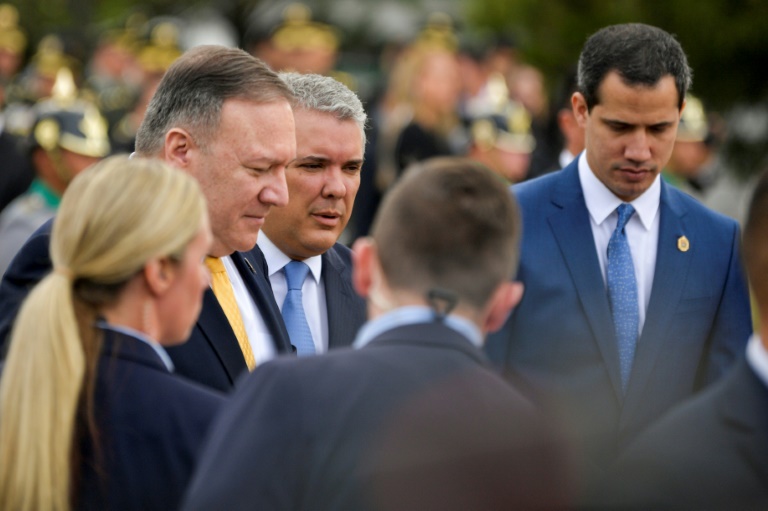US Secretary of State Mike Pompeo called on Monday for cooperation in the struggle to remove Venezuelan President Nicolas Maduro from office amid a long-running crisis in the South American country.
The appeal came as Pompeo met with Venezuelan opposition leader Juan Guaido for strategy talks.
“We must put an end to Maduro’s tyranny which harms Venezuela’s citizens and has an impact on the entire region,” Pompeo said after meeting with Colombian President Ivan Duque in Bogota.
Guaido, who arrived on Sunday in Bogota in defiance of a travel ban, plans to travel to Brussels for a meeting with the EU’s foreign policy chief on Wednesday and then on to Davos, Switzerland to attend the World Economic Forum.
He was pictured walking alongside Pompeo and Duque at the opening of a regional anti-terrorism summit.
Pompeo, who arrived in Colombia on Monday morning at the start of a tour of Latin America and the Caribbean, praised Duque for providing support for Venezuelans who “are rejecting authoritarianism and demanding freedom.”
Read Also: BBC Boss Tony Hall To Step Down In Six Months
Pompeo said he and Duque discussed “the enormous humanitarian crisis in Venezuela caused by the Maduro regime.”
More than 4.6 million people have fled Venezuela due to the economic and political crises, according to the United Nations, with those left behind facing shortages of food and medicines.
Power blackouts are frequent while salaries and savings have been made virtually worthless by the highest inflation in the world. Venezuela has been in recession for five years.
Duque said US support for those refugees was “important” but that more was needed from other countries “to fight the pernicious impact of Maduro’s rule and the humanitarian disaster.”
Pompeo praised the treatment of the 1.6 million Venezuelan refugees in Colombia, in “contrast to the misery inflicted by Maduro.”
– Stalled optimism –
 AFP / Raul ARBOLEDAUS Secretary of State Mike Pompeo (right) shakes hands with Colombia President Ivan Duque as the two meet in Bogota to discuss the humanitarian crisis in Venezuela
AFP / Raul ARBOLEDAUS Secretary of State Mike Pompeo (right) shakes hands with Colombia President Ivan Duque as the two meet in Bogota to discuss the humanitarian crisis in VenezuelaThe United States has been Guaido’s main backer in the 36-year-old’s bid to oust Maduro from power.
A year ago he declared himself acting president, a move quickly supported by Washington and more than 50 countries.
But he said he needs to “force the situation” including through “diplomatic pressure” in order to push Maduro out.
Following their meeting, Pompeo said the US would take “permanent actions … to continue to support President Guaido and the Venezuelan people.”
At this time last year, the US was pushing a line about all options being on the table, including military invention, although nothing ever happened on that score.
Guaido insisted that option was “a tool” that was considered “responsibly” because of the “very high social cost” Venezuela is paying.
Initial optimism that Guaido could rally Venezuelans behind his cause dimmed over time and his popularity slid from 63 to 39 percent, according to pollsters Datanalisis.
However, he was welcomed in Bogota with full presidential honors after his surreptitious departure from Venezuela, where he has been banned from leaving the country.
Guaido said he took “many risks, I made many sacrifices but with a lot of responsibility” to sneak out of Venezuela.
The visit echoed a similar journey last February, when he slipped into Colombia and embarked on a regional tour to appeal for help in bringing in desperately needed humanitarian aid.
Venezuela’s armed forces — which remain loyal to Maduro — blockaded border entry points from Colombia, Brazil and Curacao to keep the aid from rolling.
China, Russia and Cuba have also provided support to Maduro’s socialist regime.
Maduro has grown bolder as the effort to oust him stalled and earlier this year tried to block Guaido’s re-election as National Assembly president.
Two weeks ago, security forces prevented Guaido and some allied lawmakers from entering the legislature where a vote was due to take place in which Guaido was expected to be re-elected.
In Guaido’s absence, another lawmaker, Luis Parra, declared himself parliament speaker with the backing Maduro acknowledging his claim.
Last week the armed forces continued their National Assembly blockade when Guaido tried to hold a parliamentary session, forcing the legislature to sit in a hotel.
– ‘Terrorism’ –
The Venezuelan situation also was raised at the terrorism conference in Bogota.
The Colombian president called for “greater sanctions” against the leaders of the regime in Caracas, whom he accuses of supporting “terrorists” in Colombia.
Pompeo said Maduro’s regime “must be held to account for its support” of dissident guerrilla groups operating in Colombia, such as the ELN and the rebel remnants of the disbanded FARC.
He also said Lebanese Shiite group Hezbollah, which is considered a terrorist group by the United States and Britain, “has found a home in Venezuela under Maduro. This is unacceptable.”
The US Southern Command announced it would take part in joint military exercises in Colombia from January 23-29.
AFP

